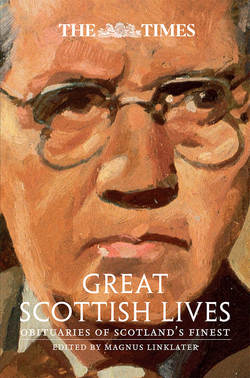Читать книгу The Times Great Scottish Lives: Obituaries of Scotland’s Finest - Magnus Linklater, Magnus Linklater - Страница 16
ОглавлениеThe Marquis of Queensberry
‘A man of strong character, but unfortunately
also of ill-balanced mind’
1 February 1900
The death of Lord Queensberry, which occurred last night in London, removes a curious figure from the social world. The late peer represented a type of aristocracy which is less common in our time than it was a century ago − the type which is associated in the public mind with a life of idleness and indulgence rather than with the useful aims which such a man as the late Duke of Westminster set steadfastly before him. The eighth Marquis of Queensberry was in many ways a man of strong character, but unfortunately also of ill-balanced mind, and he never turned to any account either his talents or the powers which his position gave him. For his failure to do so he was perhaps not altogether to blame. The title he bore still has associations clinging to it from the days of the fourth Duke of Queensberry, whose personality is preserved to us in the memoirs of the 18th and early 19th centuries. For more than half a century “Old Q.,” as he was called, was notorious for his follies and wildness. He began to be noted for his escapades before he left school. At 70 he was still a “polished, sin-worn fragment,” and the picture of him that lives in the mind of posterity is that of a worn-out roué,
“Ogling and hobbling down St. James’s-street.”
Thackeray, of course, drew a portrait of him in his younger days, when he was Lord March, in The Virginians.
It cannot be said that the eighth marquis, his kinsman, did anything to bring the title into better repute. Born in 1844, he succeeded his father at the age of 14. The seventh marquis was killed by an accidental discharge of his gun while he was shooting, and by a sad coincidence the same manner of death befell the late peer’s heir, Lord Drumlanrig, a popular young nobleman, who had been a Lord-in-Waiting to the Queen and had acted as assistant private secretary to Lord Rosebery when he was Foreign Secretary in Mr. Gladstone’s 1892 Ministry. Shortly before his death, Lord Drumlanrig had been created, for purposes of official convenience, Lord Kelhead, so that he was able to sit in the House of Lords with his chief. A curious feature of the situation thus brought about was that the son became a peer of the United Kingdom with a seat in the Upper House, while the father was only a Scottish peer and had no seat. He had sat from 1872 until 1880 as a representative peer for Scotland, but in the latter year he was not re-elected. Lord Kelhead died in October, 1894, at the age of 27, and his brother, Lord Douglas, became heir to the title.
Lord Queensberry was an undoubted authority on one thing, and that one thing was boxing. The Queensberry rules, which govern the contests of the prize-ring, will keep his fame alive at any rate amongst pugilists and amateurs of the “noble art.” Of his career there is little to be said. He served in the Navy for a time, and he held a commission in the Dumfriesshire Volunteers. Except in these capacities he came little before the public, save when his eccentricities were subjects of nine-day wonder for all the gossips of the town. As an instance may be mentioned his demonstration at a performance of Tennyson’s drama, The Promise of May, at the Globe Theatre in 1882. At a certain point in the play Lord Queensberry rose in the stalls and protested, in the name of Free Thought, against the manner in which the poet had drawn the character of a freethinker, denouncing it as “an abominable caricature.” He was at this time a strong supporter of Mr. Bradlaugh and other militant apostles of Atheism. Lord Queensberry’s intervention in a scandalous case which disturbed society some years ago will probably be within most people’s recollection. The action he then took was dictated by the fact that the name of his son, Lord Alfred Douglas, was connected with the proceedings, which eventually brought the affair into a criminal Court.
Lord Queensberry married in 1866 Sibyl, daughter of Mr. Alfred Montgomery and granddaughter of the first Lord Leconfield. By her he was divorced in 1887. He married again in 1893, but in the following year the second marriage was also annulled.
Lord Douglas of Hawick, who now becomes marquis, was born in 1868. He is married to a daughter of the Rev. Thomas Walters, vicar of Boyton, Launceston, and has two sons and a daughter. Besides the sons of the late marquis already mentioned, there is Lord Sholto Douglas, who gained a curious reputation in America some years ago. There is also one daughter, who was married last year to Mr. St. George Lane Fox-Pitt.
